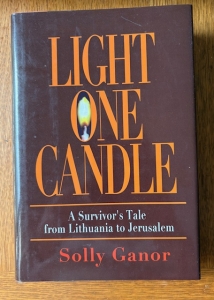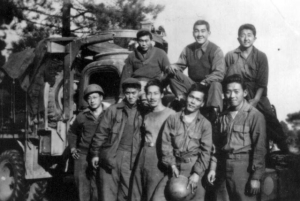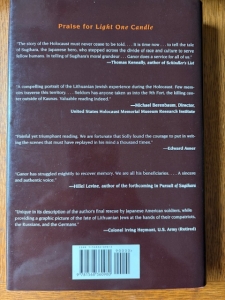Remembering Solly Ganor, and “Light One Candle”
 In 1995, when I was editor-in-chief for Kodansha America, the US division of the then largest Japanese publisher, Kodansha Ltd., I edited a powerful Holocaust memoir whose author is mentioned in a moving Washington Post article out this weekend headlined, “How a little-known Japanese American battalion freed Jews from a Nazi death march,” linked to here. The book was titled, Light One Candle: A Survivor’s Tale from Lithuania to Jerusalem, by Solly Ganor (1928-2020). It recounts how in early May 1945, a little more than eighty years go, the author’s life was saved at Dachau by Clarence Matsumara, also mentioned herein—a US service member who was part of the 522nd Field Artillery Battalion, made up mostly of Japanese Americans, many who had relatives then interned by the American government.
In 1995, when I was editor-in-chief for Kodansha America, the US division of the then largest Japanese publisher, Kodansha Ltd., I edited a powerful Holocaust memoir whose author is mentioned in a moving Washington Post article out this weekend headlined, “How a little-known Japanese American battalion freed Jews from a Nazi death march,” linked to here. The book was titled, Light One Candle: A Survivor’s Tale from Lithuania to Jerusalem, by Solly Ganor (1928-2020). It recounts how in early May 1945, a little more than eighty years go, the author’s life was saved at Dachau by Clarence Matsumara, also mentioned herein—a US service member who was part of the 522nd Field Artillery Battalion, made up mostly of Japanese Americans, many who had relatives then interned by the American government.
Earlier in Solly’s life, at age eleven in Kaunas, Lithuania, he happened to meet and befriend the Japanese consul, Chiune Sugihara, who boldly, and without permission from his own government, was signing hundreds of transit visas for Jews and other Lithuanians desperate to flee Nazi-occupied countries. Solly and his family could have tried to leave, but did not. Later, the local Jewish population was corralled into a ghetto, which Solly frequently dared to escape from, entering the larger part of the city for food, and other necessities of life, among them books. Later, he was impressed into forced labor by the Nazis, harsh servitude he somehow had survived until the day he was found by Clarence and his unit, emaciated but alive. When Clarence appeared over him, as he gazed on the face and features of a person of Japanese heritage, he thought of Sugihara, and knew he was looking at someone who would help him.
The Post article links to an oral history that Solly provided to the Holocaust Museum in 1997, and I’m also linking to it here. With the 80th anniversary of V-E Day celebrated in the Allied countries just last week, and even marked with proper solemnity in Germany, I was inspired to read the Post article about the Japanese unit that fought the Axis in Europe, and remember working with Solly on his moving memoir, which covers the same period.


